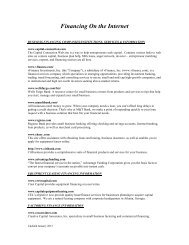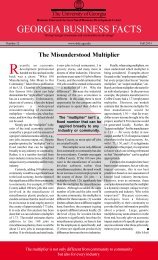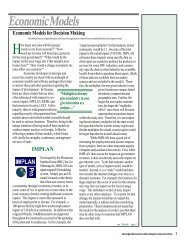Looking Ahead - Georgia Small Business Development Center
Looking Ahead - Georgia Small Business Development Center
Looking Ahead - Georgia Small Business Development Center
Create successful ePaper yourself
Turn your PDF publications into a flip-book with our unique Google optimized e-Paper software.
arriers, as documented each year by the World Bank, and overall business activities in thesecountries have likely increased as a result. 15With these facts in mind, a number of tax and regulatory changes will take place in thecoming years, and small business owners will be paying close attention to each of these. At thefederal level, several tax provisions of 2001 and 2003 are set to expire after FY 2010, and therewill be a lot of debate over which ones will be extended and which should be allowed to expire.Government leaders will also need to address the alternative minimum tax at some point, whichcontinues to affect more and more small businesses each year, and state governments continue tograpple with fiscal pressures that affect their tax policies. 16 On the regulatory front, it isanticipated that there will be a significant influx of new regulations at the federal level on issuesranging from homeland security to finance. As these rule changes are considered, small businessinterests will need to be thoroughly considered.Cost and Availability of Health InsuranceHealth insurance premiums have risen substantially in this decade. The Kaiser FamilyFoundation reports that the cost of employee-sponsored health insurance plans has increased 119percent since 1999, with a 5 percent increase in 2008 from the previous year. 17 These premiumincreases have forced small business owners to make changes to the coverage they offer theirworkers, including sharing the cost of coverage with their employees, pursuing lower cost optionssuch as consumer-driven plans, or choosing not to offer health coverage at all. A recent surveyby the NFIB found that nearly half of all small business owners shopped around for health carecoverage in the past three years; however, only 1 to 2 percent dropped coverage altogether. Thereport goes on to suggest, “The reason for stagnation or decline in the number of small businessesoffering health insurance, therefore, appears to be that the owners of new firms are increasinglyreluctant to offer it.” 18It is well-documented that there are 46 million Americans who do not have healthinsurance, 19 and many of those people work for a small business. Indeed, research continuallyshows that employees at smaller firms are less likely to receive health insurance or other benefitsthan those at larger firms. 20 While virtually all of the employers with 200 or more employeesoffered health benefits to their workers, only 62 percent of business with fewer than 20015 World Bank Group (2008).16 Bruce (Forthcoming, 2008).17 Kaiser Family Foundation and the Health Research & Educational Trust (2008).18 National Federation of Independent <strong>Business</strong> (2007).19 DeNavas-Walt, Proctor, and Smith (2008).20 Joel Popkin and Company (2005) and Econometrica, Inc. (2007).4
















